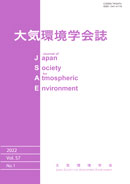
- Issue 6 Pages 129-
- Issue 5 Pages 109-
- Issue 4 Pages 101-
- Issue 3 Pages 77-
- Issue 2 Pages 35-
- Issue 1 Pages 1-
- |<
- <
- 1
- >
- >|
-
Syuichi Itahashi, Hikari Shimadera, Hiroshi Hayami, Tatsuya Sakurai2022Volume 57Issue 6 Pages 129-138
Published: November 04, 2022
Released on J-STAGE: November 04, 2022
JOURNAL FREE ACCESSIn Japan, there remain several regions where the air quality standard for PM2.5 have not been attained, and the Seto Inland Sea is one of them. To consider the reason for the high PM2.5 concentration in this region, the vertical profile of meteorological parameters and PM2.5 concentration were measured by drone at a site facing the Seto Inland Sea. We collected a total of 15 times measurements at 10, 30, 100, 300, 500 m a.s.l. during the 2020 autumn. The highest PM2.5 concentration was measured by drone at 6 AM on October 14. This high concentration was also observed by the nearest Atmospheric Environmental Regional Observation System (AEROS) measurement sites. Over the Seto Inland Sea, a higher PM2.5 concentration was observed from evening to night over Okayama prefecture, and subsequently observed during the morning over Kagawa prefecture. Combining the result of numerical modeling simulation, the stagnant air between the Chugoku and Shikoku mountains is a possible factor to cause high PM2.5. In addition, the long-range transport from the Asian continent is also an important factor to enhance PM2.5 in this region.
View full abstractDownload PDF (13502K)
- |<
- <
- 1
- >
- >|